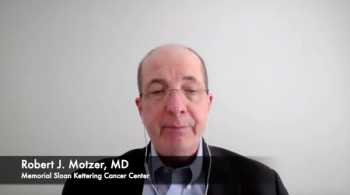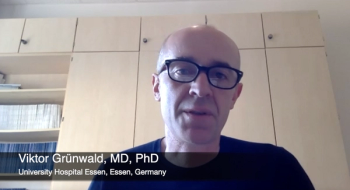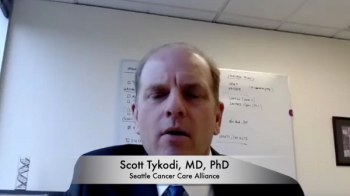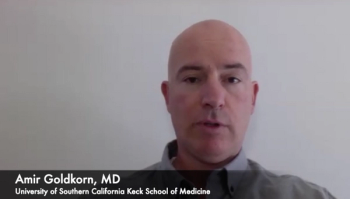
Petros Grivas, MD, PhD, regarding updates in genitourinary oncology that were read out at the meeting.

Your AI-Trained Oncology Knowledge Connection!


Petros Grivas, MD, PhD, regarding updates in genitourinary oncology that were read out at the meeting.

Petros Grivas, MD, PhD, discusses the impact of avelumab on patients with advanced urothelial carcinoma in the first-line maintenance setting.

Motzer discussed time to deterioration end points for patients with advanced renal cell carcinoma treated with pembrolizumab and lenvatinib in the first-line setting.

Almost all patients with nonmetastatic castration-resistant prostate cancer treated on the phase 3 ARAMIS trial were able to receive the full planned dose of darolutamide for their disease.

CancerNetwork® sat down with Robert A. Figlin, MD, at the 2021 ASCO Annual Meeting to discuss results of the CANTATA trial of cabozantinib with or without telaglenastat.

Choueiri detailed combination treatments with follow-up data presented at the 2021 ASCO Annual Meeting.

The recommended phase 2 dose of pembrolizumab plus cabozantinib induced a response with a manageable safety profile for patients with mRCC.

Lenvatinib plus pembrolizumab was efficacious for patients with advanced renal cell carcinoma and performed well in subgroup analyses of International Metastatic Renal Cell Carcinoma Database Consortium risk categories and target kidney lesions.

Adding abiraterone acetate and prednisone to androgen-deprivation therapy and docetaxel improved radiographic progression-free survival for men with de novo metastatic castration-sensitive prostate cancer.

A post hoc analysis of the CLEAR trial shows that patients may derive an overall survival benefit with lenvatinib plus everolimus versus sunitinib for frontline treatment of RCC, with efficacy ongoing.

Despite failure to reach the primary end point of statistically significant overall survival benefit, TAK-700 plus androgen-deprivation therapy for metastatic hormone-sensitive prostate cancer may be a valid treatment option for some patients.

CancerNetwork® sat down with Matthew D. Galsky, MD, at the 2021 ASCO Annual Meeting to discuss his thoughts on research he believes has the greatest potential to impact standard of care treatment of bladder cancer.

Disparities regarding comprehensive genomic profiling came to light during a presentation at the 2021 ASCO Annual Meeting.

As a bladder-sparing treatment strategy, transurethral resection of the bladder tumor with nivolumab and chemotherapy showed promise for patients with muscle-invasive bladder cancer.

For men with asymptomatic or mildly symptomatic mCRPC, using bone-protecting agents during treatment with radium-223 plus enzalutamide controlled the risk for fractures.

Pembrolizumab plus gemcitabine and concurrent hypofractionated radiotherapy to treat patients with MIBC demonstrated safety and efficacy.

CancerNetwork® sat down with Matthew D. Galsky, MD, at the 2021 ASCO Annual Meeting to talk about data from a phase 2 trial examining the use of neoadjuvant nivolumab plus gemcitabine/cisplatin prior to bladder-sparing surgery.

As frontline therapy, pembrolizumab plus axitinib led to a statistically significant survival benefit over standard-of-care therapy, according to data presented at the 2021 ASCO Annual Meeting.

Across 3 health-related quality of life scales, the combination of pembrolizumab plus lenvatinib had similar or better outcomes than sunitinib for patients with metastatic renal cell carcinoma receiving treatment in the frontline.

CancerNetwork® sat down with Viktor Grünwald, MD, PhD, at the 2021 ASCO Annual Meeting to talk about how new data from the CLEAR trial serve to further inform clinicians about lenvatinib and pembrolizumab for first-line renal cell carcinoma.

Regardless of primary tumor site or disease stage, avelumab maintenance was able to elicit overall survival benefit versus best supportive care for platinum-treated urothelial cancer.

Follow-up data from the phase 3 TIVO-3 trial that were reported at the 2021 ASCO Annual Meeting serve to further support the use of tivozanib versus standard-of-care sorafenib in patients with metastatic renal cell carcinoma who have failed on prior therapy.

Phase 1/2 data presented at the 2021 ASCO Annual Meeting for the novel PSMA-targeting agent HPN424 show tumor responses in patients with pretreated metastatic castration-resistant prostate cancer.

Data from the KEYNOTE-564 trial presented at ASCO indicate benefit of pembrolizumab therapy in patients with clear cell renal cell carcinoma who were receiving therapy in the adjuvant setting.

A 40% reduction in the risk of death was observed when 177Lu-PSMA-617A was added to standard of care therapy in patients with PSMA-positive metastatic castration-resistant prostate cancer.

The Seattle Cancer Care Alliance expert discusses key takeaways from cohort a of the KEYTRUDA-427 study, evaluating pembrolizumab monotherapy in patients with clear cell renal cell carcinoma.

The Seattle Cancer Care Alliance Expert offered background on cohort A of the KEYNOTE-427 trial.

Results of phase 3 CONDOR study could have a far-reaching impact on patients with prostate cancer.

The University of Southern California expert discusses next steps for the trial and how the recent results could impact the future of care for patients with prostate cancer.

Results showed that once daily relugolix established superiority over leuprolide and reduced the incidence of major cardiovascular events.